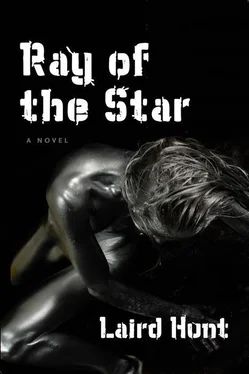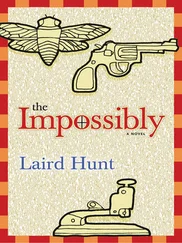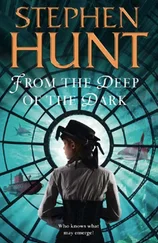Harry once took and did poorly in a course in elementary logic, and while apart from the gross outline of a few riddles involving knights and knaves, which as we have seen had become one of the weapons in his fights against his legs, very little of the content of the course now remained with him, and as he sat in the steamy bathroom and stared into Señor Rubinski’s unblinking black eyes, he found himself thinking of Wittgenstein’s “Whereof we cannot speak, thereof we must remain silent,” which his professor had scrawled on the board at the end of the course as a kind of flourish, an assertion that seemed to buttress the decision that he, Harry, had taken, if decision it could be called, to suck in his lips and hold them pinched between his teeth as Señor Rubinski first cleared his throat, then coughed, then begged Harry’s pardon, then began again to speak, and since Harry, suddenly feeling completely unequal to the circumstance, jammed his hand against the bell in his pocket and more or less pinched his mind along with his lips between his teeth during the lengthy opening movement of Señor Rubinski’s speech, which, for the record, had evoked the multiple vectors the minor — that was to say lost or unaccounted for — bits of his flesh and cloth and bone had taken while pinwheeling their way across the shop as the machine “gleefully prosecuted his demise,” we might be excused for leaving him long enough to observe that unlike the scraps of Señor Rubinski that went sailing out higgledy-piggledy across his former place of work, a radical convergence, long flirted with, of the vectors being inscribed by the various major characters in Harry’s life is now definitively underway: witness Ireneo, finally starting to warm up after a night spent chilled both in body — in his damp clothes — and in spirit — despite Doña Eulalia’s efforts to clear his mind by pulling him into her bathroom and dumping a bucket of water over his head — eating octopus porridge at a stall near the beach while Solange, not nearly as negatively affected by Harry’s lie as Harry imagines her to be, but unsettled by it — and by a highly unexpected incident about which more, in her own words, a little later — nonetheless, and consequently out walking as much to restore her circulation after a short night spent shivering in her apartment as to think things through, moves along a near-perfect line of fat palms toward him, though she is still some distance away when the connoisseurs, whose tune Ireneo has been attempting to call to mind as he gazes into the comforting mass of rice-flecked tentacles in the bowl before him, come up on either side of Ireneo and without saying a word convince him that he should take a little walk with them, which is the moment that Solange spots the four of them, shivers deeply, and 1) because in addition to worrying about Harry and whatever it is that is supposed to be coming for him or that he now thinks is coming for him and isn’t ready to talk about, she has spent a good portion of the time since she last saw Ireneo wondering what became of him after he left Doña Eulalia’s and 2) because the newly formed quartet looks from a distance much like the one formed by the connoisseurs and Alfonso at the market, decides immediately to follow them, which she sets about with a degree of theatricality she finds almost comical, as if it were the silver angel moving with fluent stiffness from palm tree to palm tree and occasionally pressing itself against the sides of the red roofed villas then high stone buildings they pass as they move into the city, even though the moving tableau before her strikes her as anything but amusing: in fact, she very quickly becomes convinced that Ireneo’s confusion the night before must have involved the connoisseurs and, after shivering again, so hard this time that she thinks it might pass for one of Harry’s shudders and has to stop and shut her eyes and count to ten before she can continue, she finds herself swept by a series of fierce urges: to call out to Ireneo, to tell him to come with her, to run away and find Harry, to see what the connoisseurs would do — these old bastards, she thinks, whom she has never liked, even when, in the early days, they used to bring her boxes of fresh oranges and chocolate squares and fish-shaped marzipan and little bundles of wood to burn in her fireplace, until out of embarrassment and an inability to reciprocate she asked them to stop, which they did, though not graciously, a good deal of grumbling was involved, of muttering, perhaps even threats — but before she can do anything, the four of them, who have not once looked back, have entered the front door of a building, an unusual one as it occurs, one of several similar structural anomalies scattered throughout the city that were designed by the sort of visionary/crackpot who every generation or so arises in great metropolises and pulls fistfuls of the future out of his pockets and smears them all over the present, with varying results, as in the case of this building, which has always looked to Solange when she has passed it and wondered who was moving behind its oddly shaped windows not so much like it is melting, as the widely available literature suggests, as drooling, How curious that they went into that one, Solange thinks, and then it strikes her that of course she knows who is really coming for Harry, not, as he was not prepared to tell her, his lost ones, but rather the old bastards, just as they came for Alfonso, for Ireneo, for — and here she shivers again— her, which was exactly, “for her,” what Señor Rubinski said to Harry that at last made him release his mind and lips and sit up straight and listen, and so we will have to leave Solange’s revelation hanging in the air and close this parenthetical although before we do so, before we return to Harry, who after all and for better or worse is the major and ever more central shareholder in his story, and give Señor Rubinski the floor, we might just observe that as Solange, now lost in thought, begins to put distance between herself and the building, Ireneo, who has already been dismissed — and the verb is chosen with care — by the connoisseurs, steps silently out of it, squints his turquoise eyes, sees her, and begins to follow.
“For her, certainly, but also for myself,” Señor Rubinski said, “because let’s be quite clear, being dead is infinitely less entertaining than even the quietest existence, for example the variety enjoyed by a midlevel supervisor in a paper plant whose greatest joy is the near silent dinners and walks and inconsequential domestic interludes he enjoys with his wife, the smell of sautéed minnows, the swirl of multicolored hats on the boulevard, the delicious clink of cranberry crystal being set down on a pewter tray, there is nothing to smell with down there, nothing to see with, nothing to hear, we simply feel and what we feel is not always so marvelous, and thus when they came to me, I said, so to speak, ‘yes, I will do it,’ and they took me to a large room lined, as I saw afterwards, with row upon row of hangers upon which hung the repaired remains of all those who they told me were there with me, and the number was so great that when they had me back in what one of them referred to inelegantly but not inaccurately as ‘my drippings,’ which looked not much the worse for wear, incidentally, for what they had been put through when I leaned too close to the shredder, I swooned a little to think of us all being stored in this way, with all of our remains kept on hand, a practicality which they explained after kicking me back to attention that greatly facilitated the sort of furlough that from time to time they granted so many of us, and then they kicked me again and without ceremony shoved me through a door that had been burned through the rough concrete wall and I found myself in the front room lying on the marvelous red velvet couch you must have walked past when my wife brought you in to join me and which I spent endless miraculous hours on before my ravishment, if you will permit a moment’s fancy, by the shredder, not an instant of which I felt at the time, by the way, but all of which I have felt every — I underscore every moment since — regardless, there I was on the red velvet couch and then a moment later there was my poor wife, who after letting out a screech that, alas, quite neatly shattered the aforementioned cranberry glass pitcher and two out of four hourglasses from my old collection, came and knelt beside me and asked me if I had had a nice rest and then what would I like for the lunch she would begin preparing the minute we had returned from our walk, a walk I was none too eager to embark upon, being unsure of the viability, you see, of my drippings, but I had returned, as I said, in the main, for her, and so I allowed her to attempt to set a hat on my head, to whimper a little when it fell through me and onto the floor, to chatter a great deal at me about what seemed very little, and then to lead me downstairs and out onto the street, which is when I had the happy fortune of encountering you — happy not merely because of your kindness to my wife, during what she had described to me as her recent moments of doubt, but also because, and here we come to the crux of it, between the time that I had been stuffed, with very little ceremony I might add, back into my drippings and the moment I swooned, I noticed that on the short rack in the sort of dressing room they had me in there were a number of other drippings at the ready just next to the bloody hanger on which, I presumed, my own had been taken from, which would have meant very little at all except that after I swooned and before I came fully to, under the shower, so to speak, of their blows, I had the distinct impression that one of them said your name, Harry, and that the other laughed after he had said it, and while of course there are untold thousands of Harrys in the world, there have never, to my knowledge, been any others in my building, and so I said to myself when my wife mentioned you and then when we saw you, I must find a way to speak to this Harry, and to tell him what I have just told you,”
Читать дальше












